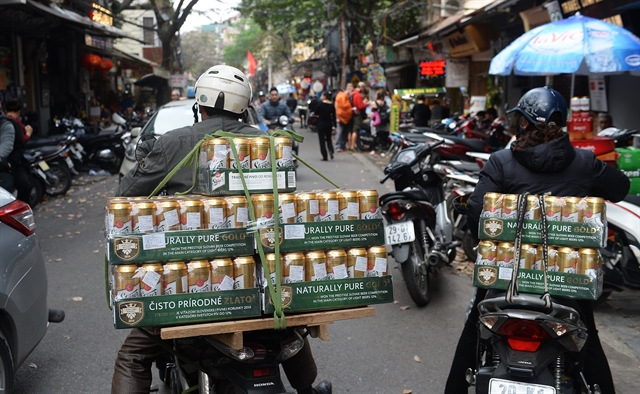 Economy
Economy


|
| Motorcyclists carry boxes of beer in Hà Nội. The new drink-driving rule prohibits driving a vehicle after consuming any amount of alcoholic beverages. — AFP/VNA Photo |
HÀ NỘI — Brewery companies have lowered their profit targets due to a severe drop in sales consumption caused by COVID-19 and strict new penalties for drink drivers.
“Beer firms saw consumption fall by 40-50 per cent in the first two months of this year, while restaurants and catering services lost 70-80 per cent of customers compared to the same period in 2019,” the Việt Nam Beer Alcohol Beverage Association (VBA) wrote in a recent dispatch sent to the Prime Minister and relevant ministries proposing they remove difficulties for the beer-alcohol-beverage industry.
The VBA said Decree 100, which took effect on January 1, slapped heavy sanctions on inebriated drivers, leading to plunging sales of the amber nectar.
The industry has suffered again since the beginning of 2020 as the spread of COVID-19 forces companies to announce layoffs and and stores selling unnecessary stuff are requested to shutter.
A number of enterprises have already changed their business plans for this year with a profit reduction of 30-70 per cent.
Sai Gon-Mien Trung Beer JSC (SMB) plans to earn VNĐ1.47 trillion (US$62.6 million) in revenue this year, down 5 per cent compared to 2019, while pre-tax profit is expected to decrease by 40 per cent to VNĐ156 billion.
The company achieved pre-tax profit of VNĐ259 billion in 2019, up 48 per cent year-on-year, and exceeded 73 per cent of its yearly target.
Saigon Beer Western JSC (WSB) expects total revenue to be about VNĐ967.3 billion in 2020, down 7 per cent compared to 2019. Post-tax profit is estimated to drop sharply by 69 per cent to VNĐ111.9 billion.
WSB recorded net profit of VNĐ161.2 billion last year, up 37.2 per cent year-on-year and exceeding 87 per cent of the yearly target.
Hanoi Kimbai Beer JSC (BHK) has set a revenue target of VNĐ231 billion in 2020, up 26 per cent year-on-year. Pre-tax profit is expected to reach VNĐ8.6 billion, down 31 per cent compared to 2019.
Sài Gòn-Đồng Xuân Beer Alcohol JSC (BSD) has a revenue target of VNĐ314.7 billion this year, with post-tax profit of VNĐ9.46 billion, equal to only 72 per cent of 2019.
Hà Nội-Thanh Hoá Beer JSC (THB) expects revenue in 2020 will reach VNĐ2.09 trillion, up 78 per cent compared to 2019 as the company plans to expand the consumption market towards the central region and seeks to export to other countries.
However, pre-tax profit is estimated to reach VNĐ7.5 billion, a 64 per cent decrease compared to 2019.
Hà Nội Beer Trading Joint Stock Company (HAT) expects revenue this year to touch VNĐ140.2 billion, equal to 88 per cent of that in 2019, and after-tax profit to reach VNĐ3.3 billion, only one third of last year.
As a response to several high-profile accidents last year, Government Decree 100/2019/NĐ-CP went into effect on January 1, the same day as the new Law on Prevention and Control of Harmful Effects of Alcoholic Beverages.
Decree 100 bans any alcoholic intake among drivers with a fine of up to VNĐ40 million and a driving licence suspension of two years for automobile drivers, and a fine of up to VNĐ8 million for motorcycle riders. Even cyclists may be subject to a fine of VNĐ600,000 for drink driving.
The Việt Nam Beer Alcohol Beverage Association, which represents domestic and international brewers, said its members had been complaining about a sharp fall in sales since the law was enforced.
The association said the reduction in beer and wine consumption has not only influenced the industry but also affected partners and suppliers, restaurants and bars, leading to thousands of unemployed workers, especially in the service sector.
The decline would lead to difficulties in tax collection, as the industry faced a high special consumption tax, corporate income tax, value-added tax and personal income tax, the VBA said. — VNS




